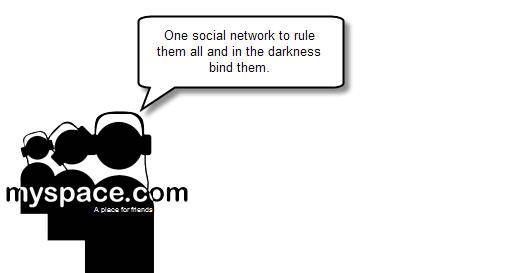By guest author Jawad
Shuaib, the founder of Shuzak.com: The social network for
geeks.
Startups have been multiplying like rabbits over the past three years. Due to the
added competition, many startups are beginning to narrow their focus to a much smaller
demographic. The year 2007 will mark the transition from startups aiming for the
mainstream markets to specialists intensely focused on gaining smaller grounds. This is a
different landscape, one that demands new rules of the game. It is the entrepreneur’s job
to anticipate these changes in order to align them with their startup’s future.
Let us take a look at the social networks available for parents; in this category
alone we have Cafe Mom, Maya’s Mom, MothersClick, MommyBuzz, MTV’s ParentsConnect,
Famster, and Minti. The niche for parenthood seems to be taken. Yet, it can further be
broken down to, say, “Grandparents”, “Stay at home mothers”, “Single mothers”, etc.
Becoming a master of any of the smaller niches has many great advantages, such as less
competition, loyal readership, and better focus. All marketers exploit a basic
positioning principle that states that it is better to be first than to be better. It is
clearly too late to be the first social network, or bookmarking service, or video sharing
startup. Consequently, the Web 2.0 era demands that startups put intense focus on their
niche regardless of the smaller demographics.
Image from web2logo.com

A short history of startups on the Internet suggests that everything starts off with a
single category, which is then naturally subdivided into more categories as the number of
competitors rise. Division is a process that is unstoppable. To survive, startups must
position themselves to be different, and the only way to do that today is to carve as
narrow a niche as possible. The article that follows dictates the immutable laws all
startups must follow for the sake of survival.
1. Divide and Conquer, Differentiate or Die:
There may never be a site as big as MySpace again. So while your slice of the market
may not be as large, by dominating an entire category, your niche can maintain a smaller
yet profitable business. As the size of a niche market declines, and the competition in
it increases, the perceived benefits of competing in that niche depreciates with each new
arrival. If your niche is small enough, you can maintain healthy profits while
discouraging potential competitors from entering your domain. [1]
The Law of Division dictates that all categories eventually diverge. They always have
and they always will. It is this divergence that creates opportunities for new startups.
The best way to build a company is not by going after an existing category, but by
creating a new category you can be first in. In other words, the survival of a startup
requires that it diverge and then specialize. Markets favor the extremes.
2. Generally Speaking, the Smaller the Niche, the More Loyal the Users
Become.
“If everyone exposed to a product likes it, the product will not succeed… The reason
that a product “everyone likes” will fail is because no one
“loves” it. The only thing that predicts success is passion, even if only 10%
of the consumers have it.” – Scott Adams, Dilbert Blog
It comes as no surprise that a niche startup that is focused on its category tends to
build a more bonded community. Digg started out as a great social bookmarking site for
geeks, but as it grew, so did its appetite for a larger share of the market.
Consequently, Digg now has many new users but fewer die-hard fans. For many startups line
extension is the easy way out. It is perceived as the inexpensive, logical way to grow.
Only when it is too late does a company turn and notice that they became large at the
expense of their user loyalty. Focus is the key to successfully building a community in
today’s ultra-competitive marketplace.
3. Focus:
Companies, especially the larger ones, have a natural tendency to expand their line of
business. Google, for instance, is known for search but has its hands in just about
anything “web”. [2] Expanding out too fast has annihilated nearly every empire and its
army in history. In a competitive environment, more is often less because with more you
lose your focus.
Big companies jump in with their brands to try to take market share from the leader
while startups pioneer new categories and sell out for millions. The benefit of operating
a niche startup is that everyone who visits the site will be looking exactly for what
they provide. Niche is all about being on the narrow point of the wedge; that advantage,
though, is ruined when a startup tries to be everything to everyone. The larger the
market, the more specialized a company must become. In the struggle for life, no two
startups can occupy the same position. If they try to do so, one company will drive the
other to extinction.
4. No Small Market is Small Enough:
The world, according to the Internet, is 1 billion strong. The web, therefore,
presents a huge opportunity for markets of any size. For instance, there are many
thousands of users on the Internet who own and love Persian cats. So if your niche social
network is for Persian cat owners, your potential market is still in several thousands.
Is that too small? For MySpace it is, but not for a niche social network. That is the
great thing about niche startups; no market can ever be too small. Even better, as the
size of the market depreciates, so does the threat of a larger competitor jumping in for
the share.
No brand, no corporation, no startup can achieve 100 percent of a market in the face
of competition. Once you accept this reality, finding a niche is greatly simplified. You
don’t have to face those demons that keep telling you, “Let’s not give up any part of the
market”. The truth is that all businesses are a niche business. The only difference is
that the leader’s niche is bigger than the niches owned by others, but it is still a
niche. Nurturing the specific needs of the niche users has become the prevalent theme for
most successful startups.
5. Mind Numbingly Simple:
“What does a person want when he or she clicks a search button?” – Phil Butler at
Profy.com
“All things being equal, the simplest solution tends to be the best one.” – Occam’s
Razor [3]
How much time does it take for anyone to figure out about 80% of iPod’s functions? Two
minutes at most. How much time does it take for someone to figure out about 80% of
Google’s functions? 5 seconds? There are 1000’s of components in the iPod, and 1000’s of
lines of code running behind Google. [4] Yet, you can get up and running with both these
technologies in less than 3 minutes. That is the law of simplicity: Be mind
numbingly simple. Extra clicks are deadly.
We tend to think of boredom on social networks as arising from a lack of stimuli. A
sort of information underload. But more and more commonly, boredom is arising from
excessive stimulation or information overload (often through excessive advertisements).
Information, like energy, tends to degrade into entropy-into just noise and redundancy.
In a world where startups are as common as ants in the jungle, it is important not to
overload the user with information. Complicated user interfaces do not help anybody.
It follows that an unfocused startup will undoubtedly complicate things by forcing
extra features onto a web page. Users like mindless choices so get rid of the question
mark lurking over the user’s head.
6. Bubble Burps:
“There is a big difference between mostly dead and all dead. Mostly dead is slightly
alive.” – Miracle Max, The Princess Bride
This time last year, Bloggers were reporting on many Digg, YouTube and Del.icio.us
clones. Many of those startups have died since, but the low cost of hosting means they
can stay online forever, despite having no users. The best way to build a startup is not
by going after an existing category, but by creating a new category which it can be the
first in. In other words, startups must focus on creating new markets over serving
existing ones.
It is no secret that almost all startups will fail. This problem started with the
bubble, and continues to plague the web today. Comparatively, not much money is flowing
into startups so there isn’t going to be another dot-com bubble. However, I anticipate
that the failure rate for startups will remain the same, if not worse. The biggest single
barrier to the development of an effective startup strategy is the strongly held belief
that a company has to appeal to the entire market. In today’s world, if a revenue less
business model doesn’t kill your startup, a more focused competitor will. [5]
Conclusion

Where is it written that a startup has to appeal to everybody? There is an almost
religious belief that a wider net catches more customers, in spite of many examples to
the contrary. A department store, for instance, is a place that sells everything. But
when a consumer requires some office supplies, they prefer Staples over WalMart. Why?
Because even though WalMart is the largest department store in the world, it cannot
compete with a specialist business focused completely on what the customer needs.
Generalists often manage to gain a larger share of the market at the expense of consumer
loyalty. In the long term, the prospect turns to the specialist.
The point is, on the Web, any additional feature adds to our cognitive workload;
distracting our attention from the task at hand. The distractions may be slight but they
add up, and sometimes it doesn’t take much to throw us. On the Internet, the competition
is always just one click away, so if you frustrate users they’ll head somewhere else. A
startup that remains focused on its niche can reduce competition and, therefore, avoid
the pressure to add pointless features. Expanding your focus and being strong somewhere
is a better approach than expanding your focus and winding up weak everywhere.
Notes:
[1] Moreover, if your niche is small enough, bigger corporations (Google, Microsoft,Yahoo, AOL) will not consider it worth pursuing. [2] A few examples include email, online videos, calendars, news, blogs, desktop
search, photo sharing, online payments, social networking, instant messaging, WiFi, word
processors, web hosting, search tool bars, spreadsheets, RSS readers, discussion groups,
maps and more. In the past, I have written two articles suggesting that Google put an end
to line extension: “How to Fix
Google” and “
Napoleonic Lessons for Google and Microsoft“. [3] Thomas Aquinas
made this argument in the 13th century, writing, “If a thing can be done adequately
by means of one, it is superfluous to do it by means of several; for we observe that
nature does not employ two instruments where one suffices”. [4] Google became the darling of the web 2.0 Generation for simplifying the search
experience. [5] A business is not a business if it does not make money. Having little defined
means of generating money is a recipe for disaster. [6] My ideas are never my own. In fact, I don’t think any idea can ever be
independently developed. The thoughts presented here were inspired by the authors of
these books: “Don’t Make Me Think”, “Trout on Strategy”, “Focus”,
“The Origin of Brands”, “The Immutable Laws of Marketing” and
“Positioning”.





















